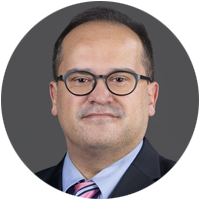Flavio Rocha, MD, FACS, FSSO | Surgical Leadership Program

Flavio Rocha, MD, FACS, FSSO, serves as the division head of surgical oncology at Oregon Health and Science University and physician-in-chief of the Knight Cancer Institute. He has dedicated his career to improving the lives of cancer patients and pioneering advancements in treatment and care. Recognizing the importance of effective leadership in driving change, Rocha enrolled in the Surgical Leadership Program at Harvard Medical School shortly after taking on a new leadership role. This transformative, yearlong certificate program provided him with the tools to sharpen his innate leadership skills, broaden his global perspective, and apply lessons learned directly to real-world challenges.
A Commitment to Patient-Centered Care in Surgery
From the beginning of his medical journey, Rocha was inspired to pursue a career in surgery, particularly surgical oncology. He was drawn by the unique opportunity to form lasting bonds with patients while making a significant impact on their lives. As a surgical oncologist, he finds this specialty exceptionally rewarding, as it allows him to support patients through some of the most difficult moments of their lives—from the initial diagnosis to treatment and recovery.
“In surgical oncology, you form a powerful connection with your patients,” Rocha explains. “It’s incredibly rewarding to be able to tell a patient, ‘We took the tumor out, and now we’ll make sure it doesn’t come back.”
With cancer being such a challenging field, Rocha feels driven by the progress made and is committed to continuing to push for better outcomes for patients.
Bridging the Leadership Gap
The Surgical Leadership program came at the perfect time—just as he was beginning a new leadership position. Rocha recognized that specialized training in leadership was crucial for success. While medical school, residency, and fellowships provide a lot of scientific and clinical training, they often lack organizational and leadership development.
“I think there’s an assumption that those skills are somehow acquired along the way,” he explains. “Surgeons are typically thought of as having leadership potential, but I think it’s important to get formal training and experience in order to really tap into that natural ability and refine it.”
When evaluating his options, he determined that the Surgical Leadership program provided a comprehensive approach to leadership development, making it the ideal choice for him at this stage of his career. The program helped him to navigate the complexities of his position with confidence and effectiveness.
Global Connections and Collaboration
The program’s hybrid curriculum, which includes three in-person sessions with global participation, enriches the learning experience by exposing participants to diverse perspectives and challenges that are facing medical professionals across the globe.
“It’s important to hear about some of the challenges colleagues have all over the world,” he says, “and it’s been really great to have this network to tap into as we tackle challenges going forward.”
Through his cohort, Rocha has built meaningful collaborations that extend beyond the classroom. He recounted visiting a colleague in Bogotá, Colombia, where they exchanged insights on establishing cancer center pathways. He later traveled to Oslo, Norway, to learn about clinical trial operations at another colleague’s institution, further enriching his experience. These global connections not only have broadened his own perspective but also have created opportunities to bring international expertise back to his team. He invited his Norwegian colleague to an upcoming national meeting to share his experiences firsthand.
Tangible Impact Through Capstone Work
One of the most significant takeaways from the program was the opportunity to develop and implement a comprehensive lung cancer treatment pathway at his institution. His final capstone project focused on designing an integrated system that streamlined the entire process—from low-dose CT screening to diagnosis and multidisciplinary care involving oncologists, surgeons, and other specialists.
This initiative, which was already in development during his time in the course, is now operational and showing promising results in addressing lung cancer, the leading cause of cancer deaths in the U.S. for both men and women.
“The capstone allowed me to take a current project I was working on and refine it with the skills and mentorship I gained throughout this course,” he reflects. “This enabled me to help design and execute a system that’s now in place, reducing wait times for lung cancer patients.”
Written by: Pamela Searle